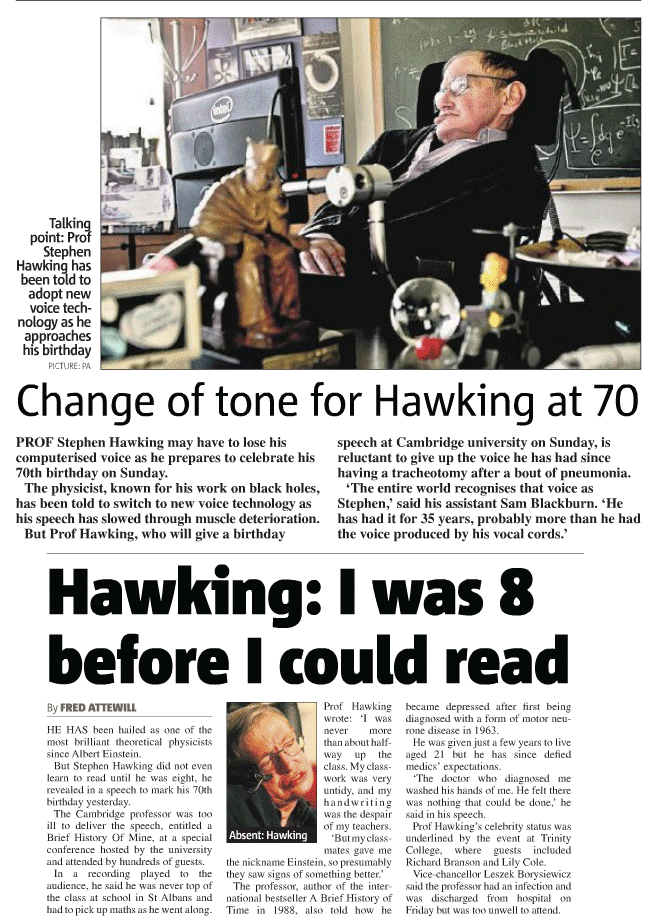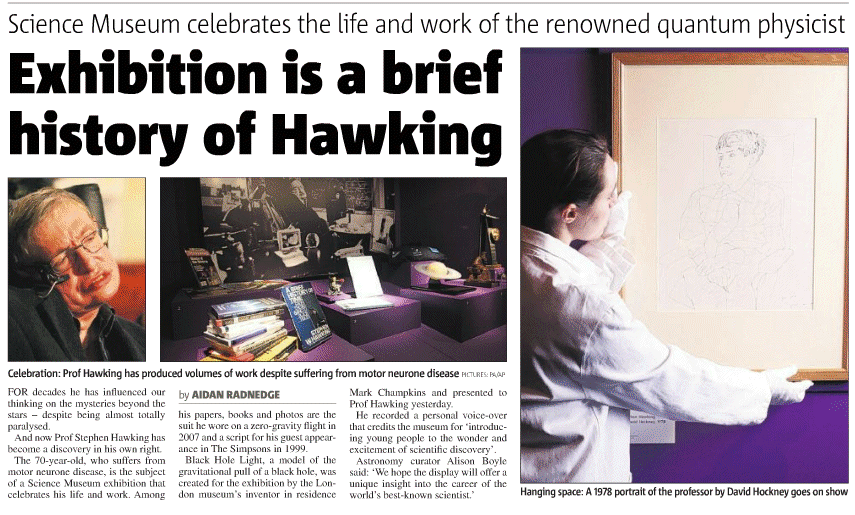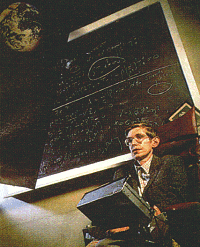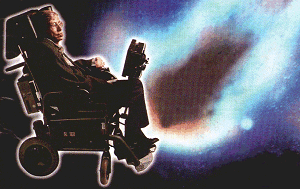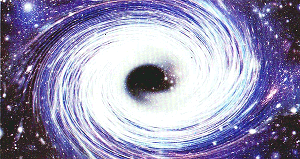Stephen Hawking:The Big Questions
|
Life, the universe and
everything-Professor Stephen Hawking will have in more answers than most
when he appears on 'The Big Question',this week. But what does he make of
these RT teasers...?
Nick Griffiths
Have we been visited by aliens?
It seems that primitive life appeared fairly soon after the earth formed
4.5 billion years ago. This suggests that the chances of life developing
elsewhere in the universe are fairly high. Some of these other forms of life
might have started on planets that were formed billions of years before the
earth so they may have progressed to space travel. The question then arises:
have we been visited by aliens and if not, why not? Despite the claims of
UFO sightings, I don't believe we have. I think that
any such visit would be obvious and probably unpleasant. What would be the
point of aliens revealing themselves only to a few cranks? If they want to
warn us of some great danger, they are being pretty ineffective.
Why did you agree to the cameo role in 'Star Trek: The
Next Generation'?
I enjoy Star Trek and think that science fiction serves a useful purpose
of expanding the imagination. Although we may not yet be able to boldly go
where no man (or woman) has gone before, we can do so in the mind. Science
and science fiction stimulate each other. The script that the
Star Trek producers provided for my
brief scene was good and the actual filming in the Paramount studios in Los
Angeles was fun. But I won't be giving up the day job quite yet.
What would you do if you won the National Lottery?
I must be one of the few people in the country who has never bought a lottery
ticket. I object to the National
Lottery because it encourages gambling and
because it takes money from those who are least able to afford it, but who
are desperate to escape their situation. It is pretty shabby of the government
to exploit their weakness. I am not impressed by the argument that it raises
money for good causes. If we think things are worth supporting then we should
be prepared to pay for them out of the tax coffers. Gambling profits are
a sleazy way of doing it. If that is acceptable, why not run the health service
on the profits of state brothels? Even if I didn't have these objections
to the lottery, I still wouldn't go in for it because the odds are so
bad - only half the money that is staked comes back as prizes. The only
certain winner is Camelot.
Does time fly when you're having fun?
Time rushes even when I'm not having fun. I have so many things I want to
do and ordinary tasks like eating and washing take me more time than most
people. But I enjoy life and it's fun most of the time. Having had my
expectations reduced almost to zero when I was diagnosed with motor neurone
disease and given only a couple of years to live [33 years ago], everything
now is a bonus. I look forward to the 21st century.
Hawking's Universe
Recalling the heady youth of the now computer-voiced scientist.
So indelibly etched on our consciousness is the image almost iconographic-
of Professor Stephen Hawking in his wheelchair, that it is hard to imagine
him ever having been any different.
Yet the first signs of the motor neurone disease that has wasted his muscles
were (not visible until Hawking's time as a postgraduate at Cambridge. That's
him in the boater , at Oxford.
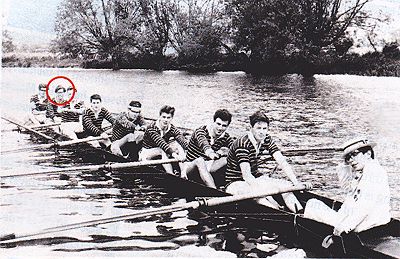 |
| Pulling together: the last time producer David Filkin (inset, circled) and Stephen Hawking (right, in boater) teamed up was when Hawking was a demanding cox to Filkin's Oxford eight |
"When I was with Stephen at Oxford we were both rather noisy undergraduates.
He was an extrovert, a fun-loving person," says David Filkin, producer of
Stephen Hawking's Universe, the series that tackles the universal
mysteries from the Big Bang to the Big Crunch.
Hawking, a physics student, coxed the eight that Filkin rowed with. "We were
an appalling collection of individuals who didn't train much," says Filkin
of the rugby playing crew. "So I knew Stephen as a very determined leader
who made sure that our boat performed far better than any of us dared expect,
because he wasn't going to let us get away with a casual ride."
This was at the start of the sixties and it demonstrates the
man's obstinacy. Motor neurone disease usually proves fatal within two to
five years. Hawking, a father of three who remarried in 1995, has survived
the disease for more than 30 years. His talents as a scientist were also
becoming clear. "One time, his physics set were in the quadrangle discussing
the week's problems. 'I've only managed two,' said one student. Another had
only solved one. Stephen rushed up and said, 'Quick, I haven't done the problems
this week, what are they like?' They said, 'We're all having trouble with
them.' So he rushed off and met them for the tutorial the next morning
and said, 'You were right, they were difficult. I've only done six.' "
Filkin and Hawking went their separate ways after leaving
Oxford. "It was only when the proposal for the series came up that I went
back to see him," says the producer, "and of course it was a huge contrast.
Here we were in our fifties, meeting for the first time since we'd been rowing
in our twenties. I wasn't sure what to expect but he immediately put me at
my ease. Now I have known two very different people on the surface who are
very much the same underneath."
|
From big bang... to big crunch, as Stephen Hawking
unravels the secrets of the universe Most of us are content to wonder what to have for dinner and how to fit it in around Coronation Street. Not Professor Stephen Hawking. Where did we come from? How did the universe begin? Why is the universe the way it is?" he asks at the start of Stephen Hawking's Universe, a six-part series that attempts to unravel the secrets of the cosmos, from the big bang to the inevitable big crunch, via black holes and parallel universes. |
||
| His hook A Brief History of Time, which
sold eight million copies, provides the basis for the BBC2 series, conceived
by producer David Filkin. Experts worldwide have been interviewed, and Hawking
himself introduces each new thread. The Cambridge Professor of Mathematics
also acted as adviser. Filkin would fax him an outline of each programme,
which Hawking would rework. "At first I was nearly put off the whole project," says Filkin. "Quite pleased with myself, I sent Stephen outlines for the six programmes. He sent back a fax listing about six points, all of which he thought were wrong. I phoned his assistant, Sue Massey, and said, 'What does this mean? Is he really not keen to do the series?' And she said, 'No, no, quite the opposite.' "Because of Stephen's communication needs [he has motor neurone disease and talks through a computer, requiring laborious typing, he keeps what he says to a minimum. Instead of spending time saying he likes this and that, he just says what he wants put right. Sue Massey said, 'If he hadn't liked the outlines for the programmes, you would have had 36 things to correct!'" NICK GRIFFITHS |
|||
|
| Warp factor five: black holes - or super-dense, super-powerful collapsed stars - affect everything around them |
There's no getting away from black holes So powerful are their
gravitational fields, not even light can escape. That's why they're black.
And that's why they can only be seen indirectly - by observing their effect
on surrounding space, by watching this week's
Horizon on how black holes produced
everything in our solar system, or by scanning for them across the parallel
universe of the net. There are web pages (1) that cover the most commonly
asked questions about black holes, from whether they definitely exist to
what you would see if you fell into one (answer: not much, you'd be dead).
To really understand how they warp everything around them, it may help to
see a computer simulation by the University of Arizona (2), which has fabulous
images and a gentle walk through the maths and physics of what happens.
Radio Times 25 November - 1 December 2000 |
Now you've seen the photos, grasped
the physics and tried the simulations, brace yourself to experience a black
hole first-hand. I don't mean the theme rides named after them - like the
in the-dark Alton Towers roller coaster (7). I don't even mean the fun but
slow-to load Space Invaders-style black hole video game you can play free
via the web (8). Such are the fascinating properties of black holes that
several sites (9) have amazing animated "fantasy movies" of what it might
be like to fall into one. And, according to a New Scientist article (10),
this fantasy could become reality: particle accelerators are now so powerful
there are fears they could accidentally create a black hole that would swallow
the Earth and everything on it. Which would be bad. |
